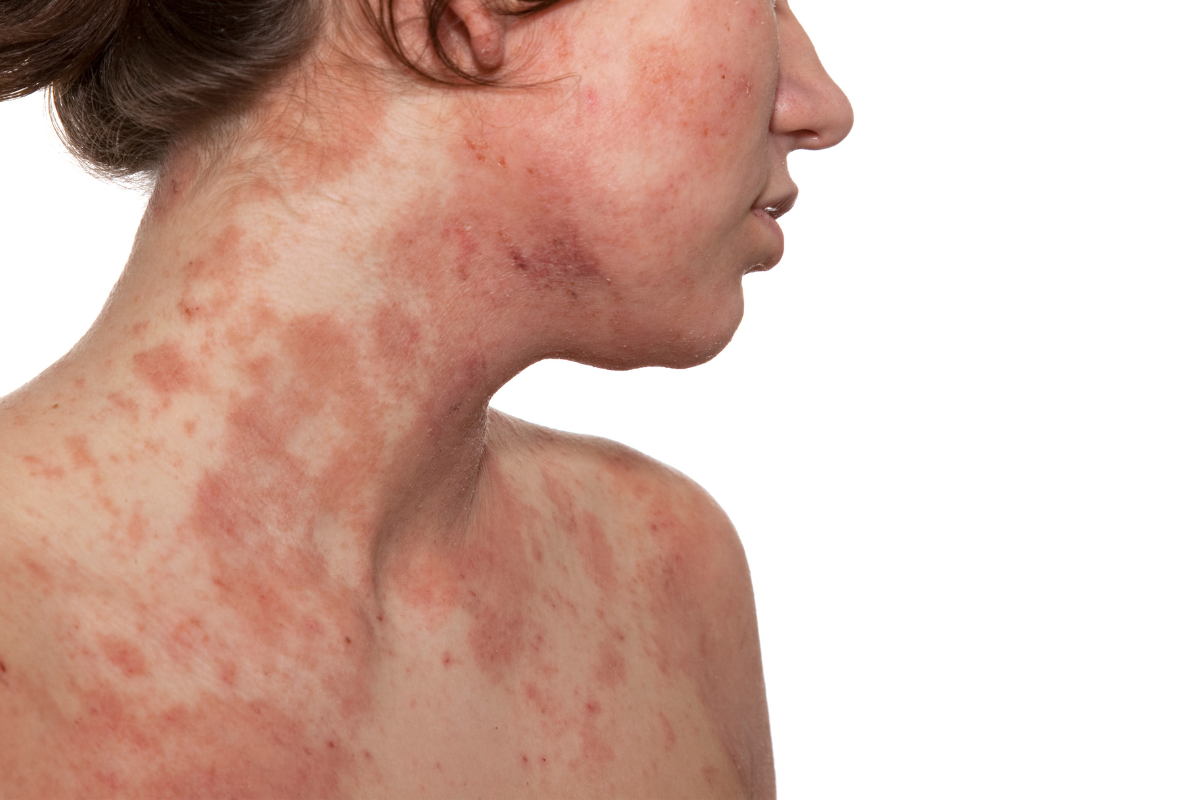Collagen and eczema (atopic dermatitis)

Collagen and eczema (atopic dermatitis)
Does collagen help with atopic dermatitis (eczema)?
People are more mindful than ever about preventative health, and the focus on nutrition as a factor in well-being has increased. Taking a supplement or two also gives a consumer a sense of control over their own health. This can be especially true for people with chronic conditions, such as eczema.
Eczema (atopic dermatitis) is one such condition. Atopic dermatitis (AD) is a chronic inflammatory skin disease characterized by recurrent episodes of intense itching and scratching, leading to painful eczema flare-ups .
This chronic skin condition can be severe, and even with the best treatments, residual symptoms may persist.
Collagen supplements can help with eczema symptoms. A consumer can choose between marine collagen (collagen from fish) or bovine collagen (collagen from cattle) and then choose whether they want it as pure collagen peptides or along with other key vitamins and minerals that are important for combating atopic dermatitis.
What is collagen?
Collagen is the most common protein found in the body, and is found largely in connective tissue. Collagen is a strong, fibrous protein that gives connective tissue its shape and strength. It also supports cell regeneration. The protein gives skin elasticity and firmness and helps it heal faster.
Cells called fibroblasts are responsible for collagen synthesis in the body.
There are at least 28 different types of collagen, each with its own unique properties determined by the "arrangement" of its amino acids. Over 90% of the collagen in the human body is type 1 collagen; fibroblasts in the skin synthesize both type I and type IV collagen.
Collagen, regardless of its origin, contains 19 amino acids, including hydroxyproline, which is not found in other proteins. Its typical amino acid composition is characterized by a high content of proline and glycine, as well as the absence of cysteine. Cysteine is a non-essential amino acid, which means that the body can manufacture this amino acid itself.
Does the skin need collagen?
Collagen synthesis is clearly an important part of skin health. But can this "glue-producing" (without collagen, your body would more or less fall apart) protein really help with eczema?
Collagen is an important part of the skin's barrier function. Insufficient collagen synthesis can lead to problems ranging from dry skin to poor wound healing.
New studies seem to show a link between collagen supplements and improved healing time/reduced inflammation in eczema patients.
A 2017 study led by the Japan Institute of Investigative Dermatology found that eczema patients who took collagen peptides had lower blood levels of inflammatory cytokines and chemokines than eczema patients who did not supplement with a collagen supplement. Chemokines are a type of cytokine that are responsible for attracting and activating leukocytes during an infection. They do this by creating a chemical gradient that guides the leukocytes towards the site of inflammation, a process called chemotaxis.
In 2022, a Canadian study found that marine collagen, which is taken from fish, jellyfish, and sponges, contributed to improved skin barrier function and faster skin healing. The reason for this appears to be that this type of collagen stimulates the migration of fibroblasts. We already know that fibroblasts play a key role in collagen synthesis; they also act as “flying troops” that migrate from their source to deal with damaged tissues. This migration is inhibited in eczema-prone skin. Marine collagen appears to improve the ability of dermal fibroblasts to migrate from the dermis to other layers of the skin, which is needed during eczema.
Collagen supplements can combat eczema
Should you take a supplement to help with eczema? When it comes to eczema, the answer seems to be a resounding “yes.” The most promising studies in recent years have focused on hydrolyzed collagen. Look for supplements that contain “hydrolyzed collagen” or “collagen peptides” for the best results. A hydrolyzed collagen powder is more easily absorbed by the body because it’s broken down into smaller pieces called peptides.
There are nearly 30 known types of collagen. Marine collagen is an excellent source of type 1 collagen, the type of collagen most commonly found in the skin.
Be careful when choosing a collagen supplement and choose a pure collagen without unnecessary additives or other unnecessary ingredients.
Vitamin D supplements may help prevent eczema
Vitamin D plays a number of roles in health and disease prevention. For eczema, the main factor appears to be related to immune system regulation, with research showing that vitamin D can:
- help modulate immune responses in various inflammatory and autoimmune diseases
- suppress overall inflammation
- promote a stronger skin barrier
- reduce the severity of eczema symptoms
Vitamin D has also been shown to affect the microbiome (which is important for healthy skin), reduce susceptibility to bacterial and viral infections, and reduce allergies.
Does collagen help with eczema?
The goal of taking a collagen supplement is not just to randomly add collagen to a damaged system, but also to stimulate your body's own collagen synthesis and fibroblast migration. For this reason, collagen supplements should be considered a small part of your eczema treatment.
A diet rich in vitamins A, C, D, and E will also provide your body with the building blocks necessary to synthesize collagen, repair damaged skin cells, and improve the skin's barrier function — all important aspects of managing eczema.
Collagen supplements can have a positive effect on skin with eczema, but there are no guarantees. There are several factors that play a role in eczema, and they differ from person to person. If you choose to supplement with a collagen powder, don't expect immediate results. Give it some time; keep a diary and take pictures (the same light every day) over a longer period of time to document your skin's response to whether your collagen intake is counteracting the onset of eczema.
Ultimately, collagen supplements shouldn't be considered a miracle cure, but rather part of your efforts to help prevent eczema flare-ups. If you decide to try a collagen peptide supplement, you should still avoid your triggers, moisturize your skin regularly, and follow your doctor's treatment plan (if one exists).
What other vitamins and minerals are important for atopic dermatitis?
The pathophysiology of atopic dermatitis (eczema) involves a complex interplay between immune system dysfunction, genetics, and environmental factors. It is well known that nutritional status is crucial for a well-functioning immune system, leading to a much-debated question of the role of dietary factors in the pathogenesis of atopic dermatitis.
Food allergies and elimination diets have been widely studied in atopy; however, less attention has been paid to how vitamins, minerals, and other micronutrients affect the risk of atopic dermatitis and the severity of symptoms. This systematic review discusses the evidence on how various micronutrients, including vitamins (C, E, and D) and minerals such as zinc, selenium, iron, copper, and magnesium, are associated with eczema, and how dietary supplements affect disease severity.
A systematic search was conducted to identify the role of oral micronutrients in eczema. The authors reviewed 49 studies. Results: Although there are weak associations between vitamin C or E and atopic dermatitis, there is sufficient evidence to suggest that vitamin D supplementation provides benefits for people with eczema. Deficiencies in selenium and zinc may worsen eczema.
- Tags: Hud/Skin Kollagen/Collagen







